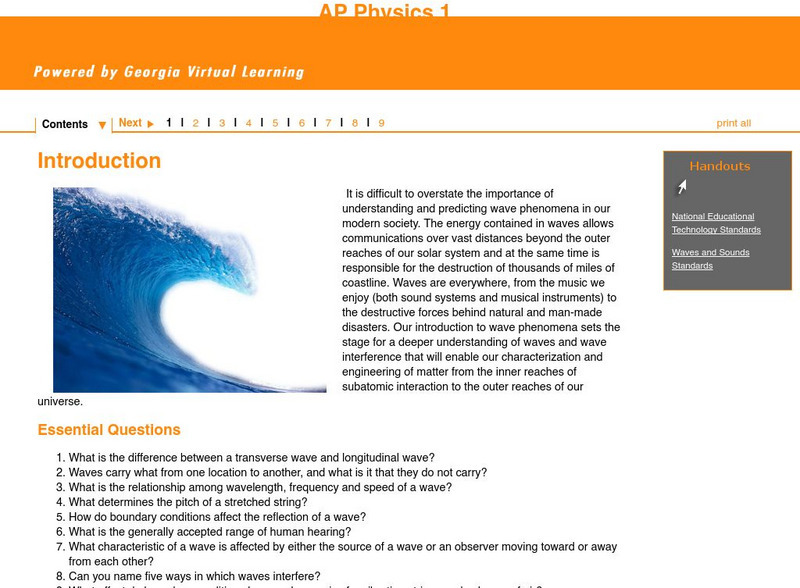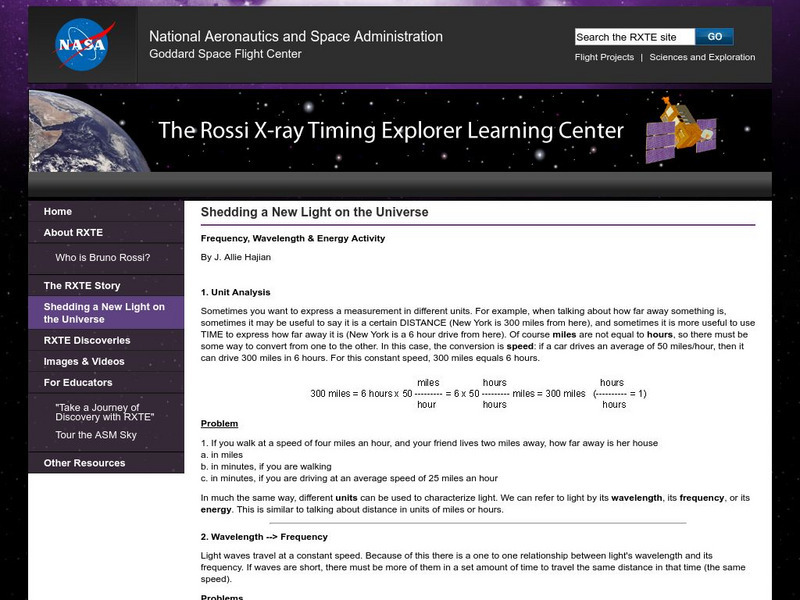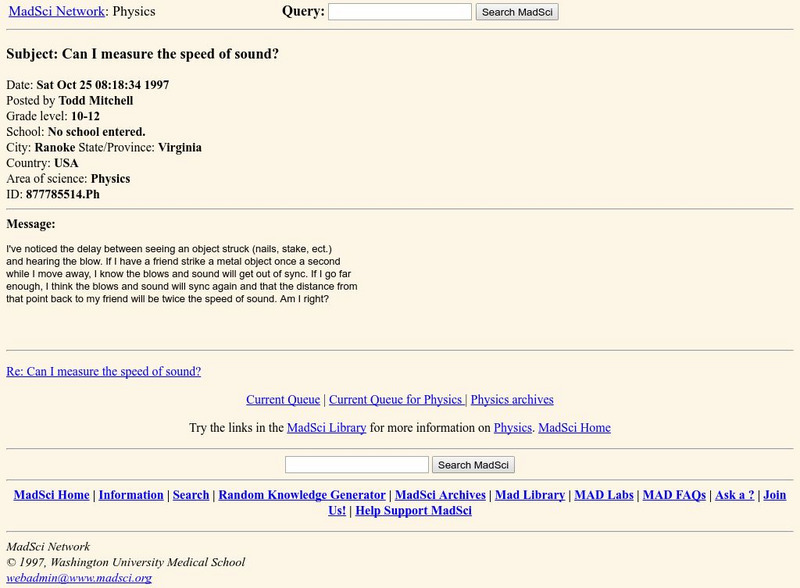Physics Aviary
Physics Aviary: Speed of Sound Lab
This lab is designed to have students investigate the relationship between the distance from an explosion and the time it takes the sound of the explosion to reach the observer. The temperature of the air can be changed by changing the...
CK-12 Foundation
Ck 12: Wave Speed Calculations
[Free Registration/Login may be required to access all resource tools.] Students investigate and analyze characteristics of waves, including velocity, and calculate the relationship between wave speed, frequency, and wavelength.
Georgia Department of Education
Ga Virtual Learning: Ap Physics 1: Waves and Sound
Students will understand and predict wave phenomena, and investigate the energy contained in waves. They will gain a deeper understanding of waves and wave interference that will enable characterization and engineering of matter from the...
Science Struck
Science Struck: How Does Sound Travel?
Discusses the characteristics of sound waves and the conditions that affect the speed of sound.
Physics Hypertextbook
The Physics Hypertextbook: The Nature of Sound
Study the details of sound from characteristics to speed, ultrasound, infrasound, and other aspects of sound waves.
Georgia State University
Georgia State University: Hyper Physics: Water Tube Resonance Experiment
Online physics lab experiment in which students use resonating waves inside of a closed-end air column to determine the speed of sound. The form allows students to check their answers and receive immediate feedback.
Physics Central
Physics Central: Physics at Your Desk: Drumming Fingers
An easy experiment through which students explore sound waves while tapping their fingers on a desk or table in a quiet room.
Physics Aviary
Physics Aviary: Wave on String Lab
This lab is designed to help students discover the connections between the linear density of a string and the tension in the string with the speed of the wave along the string. The program can be set with six identical strings or six...
Georgia State University
Georgia State University: Hyper Physics: Wave Motion
Two wave graphs depicting a sine wave and relating the various characteristics (wavelength, amplitude, frequency, and period) of a wave to each other. The site includes an interactive JavaScript form in which the visitor enters one...
Science Buddies
Science Buddies: Guitar Fundamentals: Wavelength, Frequency, & Speed
This is a rockin' project for guitarists with an interest in the physics behind music. If you have ever wondered why the pitch of the note changes when you fret the string, this project will help you understand by applying basic...
Ducksters
Ducksters: Physics for Kids: Basics of Sound
Kids learn the basics of the science of sound, the speed of sound, and volume. What is sound and how does it move? It is a wave made from the vibration of molecules.
TED Talks
Ted: Ted Ed: The Sonic Boom Problem
Objects that fly faster than the speed of sound create a shock wave accompanied by a thunder-like noise: the sonic boom. These epic sounds can cause distress to people and animals and even damage nearby buildings. Katerina Kaouri details...
University of Minnesota
University of Minnesota: Applications of Waves in Your Everyday Life
This site offers a variety of everyday activities and everyday experiences in which waves or sound waves play a role.
PBS
Pbs Teachers: Scientific American: Calls of the Wild: Bats and Echolocation
Explore bats' navigation systems by experimenting with echolocation. Approximate an object's distance by analyzing reflected sound waves, measuring the delay in sound and calculating the ratio to the speed of sound.
NASA
Rxte Learning Center: Frequency, Wave Length, and Energy Activity
Resource focuses on the relationship between the frequency, wavelength and speed of light. Has a link to an interactive activity relating frequency, wavelength, and energy.
MadSci Network
Mad Sci Network: Measuring the Speed of Sound
Can you measure the speed of sound? Find out for yourself using this site's question and answer format.
Famous Scientists
Famous Scientists: Ernst Mach
Read about the life and work of this Austrian physicist and philosopher, known for his contributions to physics with the Mach number and the study of shock waves.
PBS
Pbs Teachers: Scientific American: Expedition Panama: Echoes in the Night
Explore your prior knowledge about bats and investigate bats' use of echolocation to identify and catch prey. Design a game like "Marco Polo" to demonstrate echolocation.
Curated OER
Hyper Physics: Water Tube Resonance Experiment
Online physics lab experiment in which students use resonating waves inside of a closed-end air column to determine the speed of sound. The form allows students to check their answers and receive immediate feedback.
Curated OER
Hyper Physics: Water Tube Resonance Experiment
Online physics lab experiment in which students use resonating waves inside of a closed-end air column to determine the speed of sound. The form allows students to check their answers and receive immediate feedback.
NASA
Nasa: Beginner's Guide to Aerodynamics
Includes exhaustive information and a wealth of activities pertaining to aerodynamics and the physics of flight.
CK-12 Foundation
Ck 12: Fourth Grade Science
This customizable digital textbook covers topics related to fourth-grade science. It is Next Generation Science Standards (NGSS) aligned.

















